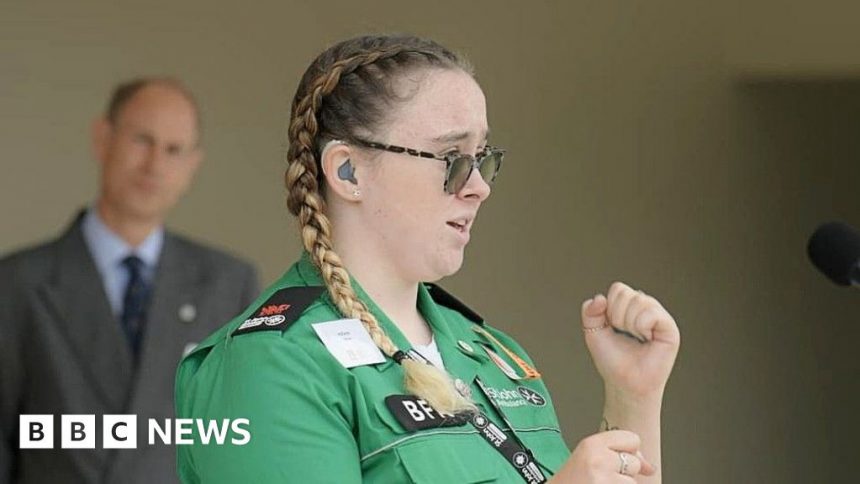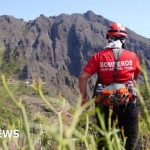Deaf woman’s long road to Buckingham Palace speech
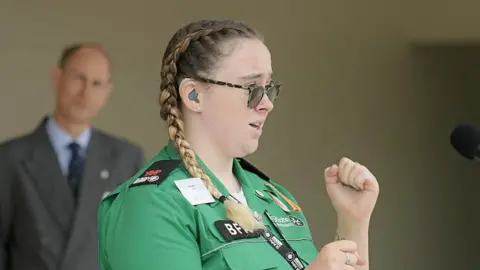 DoE/PA Media
DoE/PA MediaWhen Hafwen Clarke taught 500 people how to say thank you in sign language on the lawn of Buckingham Palace, it was the culmination of years spent spreading knowledge of signing to those around her.
The trilingual 19-year-old St John Ambulance volunteer and student had been invited to make history by becoming the first person to use British Sign Language (BSL) to deliver a speech at the palace.
Along with other young people from across the UK, she was receiving her Duke of Edinburgh (DoE) Gold Award from the new Duke, Prince Edward, who took over the role from his father Prince Philip, the founder of the awards.
As she stepped out in front of the crowd to deliver the speech she had worked on for a month, with the Duke of Edinburgh standing just feet away, Hafwen, from Aberystwyth, Ceredigion, was very nervous.
But years of challenging herself, as a deaf child and young woman in a hearing world, had stood her in good stead.
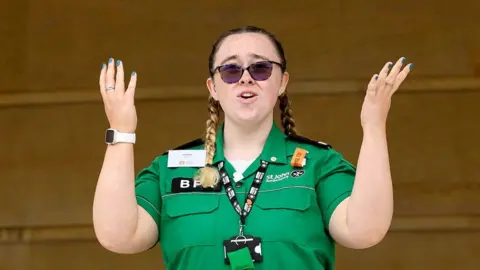 Getty Images
Getty ImagesHafwen was born without hearing into a family where her mother was a first-language Welsh speaker and her father, from England, had learned some of the language as an adult.
Her first language was BSL, but she went to a Welsh-language mainstream primary school, Ysgol Penrhyn-goch, where Welsh became her second language, and she had learning support from a Welsh to BSL signer.
But then the support worker left, and the local council said it was unable to find another one. Her parents withdrew her from school and a battle with the council ensued to try to keep her in Welsh education.
However she eventually moved to Ysgol Plascrug, an English-medium school, and had to learn to read and sign via English.
Hafwen said: “When I moved to a Welsh primary school I learned Welsh a little bit.
“My first language is BSL and my second language at the time was the Welsh language. I did alright there with some support.
“They were cutting the funding so I had to move to a different primary school which was an English-speaking school and I really struggled there trying to learn the English.”
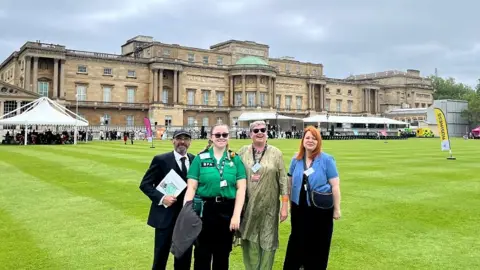 Hafwen Clarke
Hafwen ClarkeThings improved when she moved to Penglais secondary school, even though she remained in English-medium education.
“That was a mainstream school but it had a deaf unit,” she explained.
“I got to have more deaf friends and I was learning English and Welsh at the same time and I was getting on all right there.”
The “very, very busy environment” meant she did not always feel comfortable but she added: “I was confident within my deaf friends and my deaf peers using sign language.”
She played hockey at school after enjoying the game at primary level and became a mentor for disability sport and PE during her time there.
Hafwen’s journey to her historic speech started as far back as the age of 10, when she first started going to St John Ambulance groups.
She said: “My mum suggested I join. I wasn’t very confident at that time. I didn’t know how to communicate with people in the same group as me. I was very quiet.
“One friend from primary school helped me a lot. She tried to encourage me to communicate using pen and paper.”
At 18, she moved into the adult group and started supporting youth groups and helping them to learn to sign, as well as the adults she was volunteering alongside.
She said: “The adult training was much more important – the communication was important so we needed to use text messaging and notes on our phones to communicate. Some people were signing quite well.
“Volunteering is quite hard work. I was quite nervous about doing volunteer work because I couldn’t communicate very well with some of the hearing people.
“But some of my friends helped me and encouraged me and then I noticed one person could actually sign quite well, and did some signing with me and writing on bits of paper.”
For aid with communication, she works with another member of staff, saying: “It’s easier to have a hearing member of staff and me to be with them.”
She has covered festivals with 5,000 attendees, large sporting events and gigs and has done everything from bandaging injured people to performing CPR.
‘It was really hard’
She started doing the DoE awards with the group, beginning with the bronze award which was made more difficult because it happened during the Covid pandemic and continuing to the silver.
Hafwen hesitated before deciding to continue, instead wondering if she should learn to drive instead.
Again it was advice from her mother to “make a decision” which spurred her on. She said of the gold award: “It was really hard but when I achieved it, it was amazing.”
As part of it, she took part in a trek in the Bannau Brycheiniog (also known as Brecon Beacons) national park.
She said: “It was lovely. There were waterfalls, it rained a little bit and it was very hot. I was carrying my backpack. There was a lot of walking.”
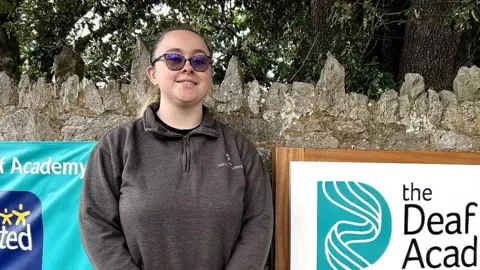 Deaf Academy
Deaf AcademyAfter finishing secondary school, Hafwen moved away from home to the Deaf Academy in Exmouth, Devon, and is now learning to be a hairdresser through a partnership scheme with Exeter College.
When the invitation to speak at the DoE presentation ceremony arrived, with some support from the academy she decided to accept.
“I said ‘yes’ because there’s some staff in the residential care home that I live in during term encouraged me to do it,” she said.
“I wrote my speech, which took me a month to write. It had to be about three to five minutes long and I told my story about Duke of Edinburgh [award].”
‘Get involved and participate’
On the day itself, in front of that 500-strong crowd she was “very nervous”.
“I was looking down at the prompt cards that I’d made. I’d put them in order so if anything fell down I could get them back together quickly because they were numbered. And then I did my speech.
“I was teaching them a little bit of sign language at the end of my speech. I taught them how to sign ‘thank you, Duke of Edinburgh’, and they did sign it back, and it was amazing.
“Then when I finished, I turned around and I was lost for words really, because Prince Edward signed ‘thank you’ to me in sign language which was amazing, and left me a bit speechless.”
She paid tribute to the support her family has given her over the years, encouraging her to push herself and “help me achieve”.
Hafwen is keen to pass this encouragement on to other deaf and disabled young people.
“If you want to join in and participate in activities, you can,” she said.
“I’ve tried to achieve so much through my life already. I can do anything I put my mind to. Just ignore people who say, ‘no, you can’t do it’.
“Every deaf person is exactly the same as a hearing person – they need to get involved and participate.”




